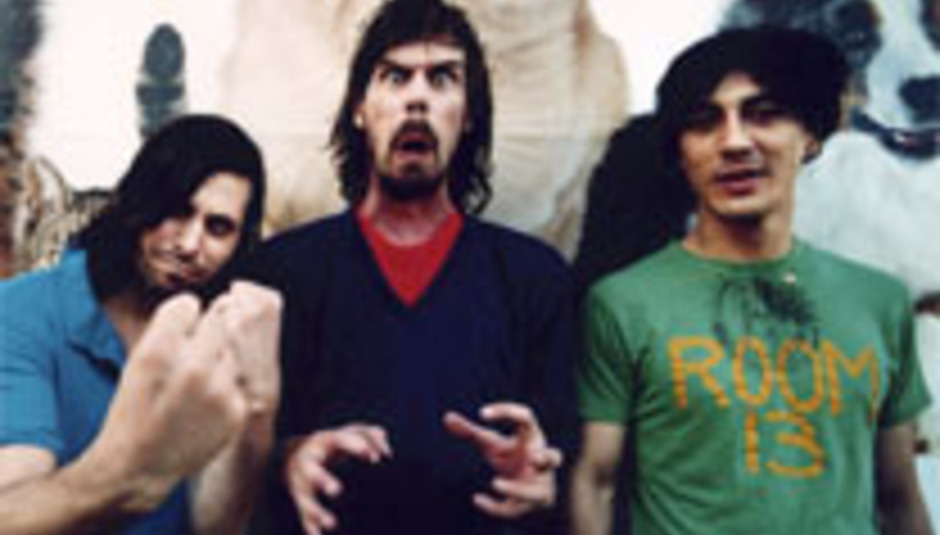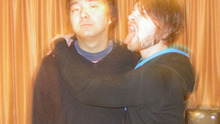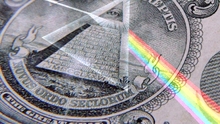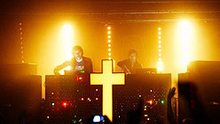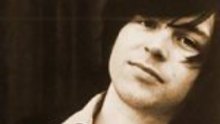This hotel is weird, so much so that if I were here to meet any other band I�d consider such a choice of temporary residence particularly inappropriate: everything is assumed elegant but rendered blocky, as if the architect had the most wonderfully sumptuous blueprints made reality using nothing but Lego bricks. It�s all squares and rectangles � even the stool I sit on, waiting in the bar (as much as �10.50 for a glass of wine, seriously) for the interviewer before me to finish, is chunkier than a Yorkie blown up by Rick Moranis in a lame Eighties Disney flick. It�s brown, too.
The corridors leading to our rendezvous � the band�s last with a member of the press for the day, I�m reliably informed � are icy cold: either the air conditioning is on the blink, or each and every closed and firmly locked door contains a brace of vampiric after-darkers, just waiting for the smiling suits downstairs to drain the last of their certainly overpriced claret; theirs will be spilt, oh yes, but no chardonnay will shift its stain. Thankfully, the one doorway that I step through leads only to three musicians, sunk deep into a comfortable, but square, settee. Liars look tired: Aaron Hemphill can barely lift his head from the cushioning behind it, his forehead occasionally creasing in some reactionary exhibition, lethargy disallowed to run its natural course; that, or he�s thoroughly bored of talking already, to journalists domestic and international; that, or he�s only now feeling the effects of the previous night�s late performance at London�s fashionable Trash nightclub; that, or I�m reading too much into something that barely necessitated a single semi-colon.
Angus Andrew � even taller of frame in the spindly flesh than you�re lead to believe from his photographs � is the most outwardly friendly, the first and last Liar to enthusiastically shake my hand; Julian Gross, the drummer at the heart of the band�s aptly titled third album Drum�s Not Dead, scribbles onto his own trouser leg with a pencil, pausing only to clear rolling tobacco from a copy of New Scientist laying on the table that separates us: three on one side, me on the other. Gross�s smile, when flashed, is an infectious one; Andrew�s relaxed demeanour one that allows me to do away with my on-paper questions, hastily scribbled but an hour prior to our scheduled interview (it�s running late, mind), almost entirely. Hemphill, though, looks like he�d rather be picking a barbed fishing hook from each of his fleshy big toes for much of our time together. Or, maybe he just likes to let his band mates do the talking�
So, last night was a small show, in a club. How�d it go?
Hemphill: (With a slight yawn) It was, err, it was fun. It was a small room� not a club, but after a while it felt like we were playing through large amps�
Gross: We lost half of the PA, so I heard.
You lost half of the PA?
Gross: No, seriously. All of a sudden they were mixing and, uh oh.
And did you get the impression that people there had come specifically to see you?
Andrew: No. We�re not that arrogant. Kids go to Trash � for whatever reason they go there, they go there.
I suppose it�s a nice way to break yourself into these British dates, though, with a small �secret� show. Speaking of which, you�re not actually doing a �proper� London show this month�
Andrew: The ULU show, next month, is our big show. We�re on tour between now and then, in Europe. I think we need that time to be able to put on such a big show.
Gross: That, last night, was a warm-up show. It was the first one in so long.
Andrew: We played in Greece last week. We had two shows there.
Gross: It�s a good market!
Andrew: We actually have a friend, who�s Italian, who has kept us very much on the job in Italy. He�s given us lots of shows. Last summer we played a festival in Greece, before Jamie Lidell, and it was really awesome. If you play that sort of festival, then you can expect to go back every once in a while.
And is playing to non-native English speakers any different to performing for the likes of the Brits?
Andrew: No, no� I think we do some sort of very primal thing, and I don�t notice so much of a difference. If anything, it�s the foreign crowds that want to sing along, if they know it. Isn�t that funny? That�s not going to happen in New York, or London. We�ve never really been too concerned if the crowd�s going crazy or not. To me, honestly, we can have very different types of performance � sometimes you�re aware that people are watching everything you do as opposed to there being beer flying everywhere. It becomes a very studied movement piece; it becomes interesting in that way.
Have people been taken aback at all by the new material, live or on record?
Andrew: It�s always like that. People said, �When you first came to play in Berlin, we were all excited for Trench, but you just played Drowned, so we thought we were watching the wrong band�. I think it�s something that people get used to, perhaps to the extent now that they expect it of us.
But now a precedent has been set, surely existing fans must be aware that one Liars record isn�t necessarily going to sound all that much like the one before it?
Andrew: I think we�re pretty glad to be in a position where we don�t have to cater to anyone, and that people are coming to our shows because they want to see something they�re not expecting.
Gross: We�re not trying to set out to alienate people.
Well, I suppose if you�re not challenging yourselves, then you�re not going to be bothered, and the quality will dip�
Andrew: Exactly, good point. That�s really the basis of it all.
So the set up you have with Mute: do they need to hear your material from album to album, as it�s progressing? Did they hear Drum�s Not Dead as it was going along?
Andrew: They did. It was a little different with the one previous, Drowned. I think they were a bit more, I would say, concerned.
And did their concern in turn concern you?
Andrew: Yeah, I think so. This record wasn�t a smooth process; it wasn�t all roses and fairies because we had a lot of time to really think about what we were doing, and how we were doing it, and we weren�t always doing the right thing. With Mute, we knew they were expecting something from us, and obviously that came into it. We had to play it to them, but they�ve never been overbearing in that sense.
Do you think that, come album number two, they were expecting a whole album of �Mr Your On Fire Mr�-style songs? Andrew: That�s what�s so strange, though, because they absolutely didn�t. When we played Drowned to them, they suggested that the vocals could come up a bit, y�know, and that was it. There was never any pressure from them � obviously that period was difficult for them, in terms of what we were doing, but they�ve eventually been glad we went the way we did. Mute, in a sense, is known for its way of working long term, and that was expressed to us at the outset�
Perhaps they�re holding out for you to do a Moby?
Andrew: (Laughing) Yeah, I�m sure! They�re hoping that some day having us will pay off!
Perhaps the most immediately interesting feature of Drum�s Not Dead, all talk of label-worrying weirdness aside, is that it comes with a DVD (whether you buy it on compact disc or vinyl, your DVD will be included). It contains a trio of films, each featuring twelve clips for twelve songs � thirty-six videos in all � that run for the duration of the album, each adding specific visuals to music so colourful it barely needs any: the listener�s mind can wander aimlessly, joyously so, just as easily as it can act passively, enjoying what the three filmmakers � award-winner Markus Wambsganss, Gross and Andrew � have to offer in the way of celluloid interpretations. Sometimes what�s before you is reminiscent of A-Level class nonsense; at others, visuals and soundtrack synchronise in such a way that you�re glued to the screen like a bluebottle to splattered strawberry jam on the breakfast table. On Sunday February 26, the band will perform (or perhaps they already have? Depends when you�re reading this, really) before an edit of the three films at the Curzon Cinema, Soho.
How did this gig at a cinema come about? Did they invite you?
Andrew: Yeah, and also we were looking for a venue, or a way, to show some of the films we�d made. Then this came up, along with the idea that we�d show another film that we were interested in, which we hadn�t previously thought about. It didn�t take that long to figure out what to pick � we�d recently watched a documentary about 9/11, that had us ranting and raving at each other for days, and flipping out and almost having some sleepless nights. It�s called Loose Change. There are many similar films out, but this one happened to be one we got hold of. I know they�ve just made a better-quality second edition of it. It�ll be interesting, though: it�s a sit-down show, and we�re gonna play in front of an edit of the thirty-six videos. In a sense, it�s tackling another element that we might not be prepared for.
And do you have to stick to where the song would be on the film?
Andrew: It doesn�t have to match up. That�s not really the point. People have asked us if performing with this visual element is important, and it�s not. It�s just something new to do, but it�s not something we�d usually tackle when we play live, because there are variables that we don�t have the money to do right. I don�t know if you�ve seen many bands with projections, but it�s really hard to pull it off.
And the videos that come with the new album, is that an idea you�ve had for a while?
Andrew: Since Drowned we�ve been thinking about how to make this medium of an album more valuable, or more interesting; to have people care about it when culture and technology has changed the album entirely. It�s something that could be completely rethought, as something that people consume, but at the moment it�s so scattered. Everything�s single MP3s, and stuff like that. So, this is our first attempt at finding an way to make an album more worthwhile; to invest something in it to make it more than the boring standard of twelve songs and a piece of paper. We have access to so much more than that, and it�s important for us to take on that responsibility.
Gross: It�s a challenge to take on, one that you might not be able to do or not. Well, you know you�re going to, but�
I guess by adding this new identity, I suppose, to your album you�re harking back in some way to the days when you�d buy an album and cherish it � you�d touch it, read the sleeve as it played�
Andrew: This isn�t the answer � we�ve not figured that out yet � but it is time that people started taking responsibility rather than pointing fingers at technology, which is a stupid thing to do. Record companies are complaining, but it�s them that should say to their artists: �Start giving us something more interesting.�
Gross: If these artists are complaining about downloading, then they should be offered the opportunity to produce something more, that can be given to people that they�re in charge of.
Hemphill�s eyes suddenly sparkle: talk of the new album has plucked him from the edge of slumber, or at least from the lip of indifference. There�s talk of feedback � the band, as yet, haven�t read any reviews, or at least none they�re willing to share with me. Although the trio are quick to stress that Drum�s Not Dead isn�t a difficult record � that they�re not looking to distance themselves from the people that so enjoyed their debut, for example � it is an album that only begins to reveal its multi-layered charms as many as half-a-dozen listens in. Where there is chaos one minute � the seismic charge of �Let�s Not Wrestle Mt. Heart Attack�, for example � another yields subtle melodies and charming gracefulness: the closer, recent single �The Other Side of Mt. Heart Attack�, is as pretty as anything you�ll hear all year. While the titles allude to an underlying concept, something backed up by the record�s press release, the band don�t see it as such: the �concept�, as it is, came after the writing and recording process, as if there was an unseen layer to the songs that only became apparent once they were properly assembled and subsequently titled in a way to promote, intentionally or otherwise, the idea of thematically specific and focussed content.
Do you read your press? Are you bothered about what feedback you get from the critics?
Hemphill: Yeah, I guess it does bother me. It�s not about bad or good feedback, but more about the pattern of it: it�s like there are a few people that test the water. One will be, �Yeah, this is great!�, but another will be the total opposite.
Do you expect that certain people won�t �get� Drum�s Not Dead?
Andrew: We really want people to get it, and we�re not trying to be difficult. We want to be straightforward and make songs, and what Aaron�s saying is similar to what I think. You can�t complain too much, but the idea we�ve surrounded ourselves with now is that wherever we record, or what we record about, there�s going to be an issue of �concept�. It�s hard for us to avoid this idea of us being �high-minded�, or something, which is a bit difficult for us to deal with. Sometimes you just want to be straightforward.
Gross: If someone gives an honest critique, then I like to hear what people are saying about it, �cause I did produce it�
Something your press officer said to me earlier was that a few reviews have just stolen, wholesale, from the press release�
Gross: That�s what I�m talking about�
Hemphill:�it�s just a case of narrowing down the adjectives you can use, from good to bad. I mean, I love getting critique, but mostly you just hear the same adjectives�
Gross: When you�re copy and pasting, you�re either piggybacking what that person�s saying, or you�re saying the opposite for opposite�s sake.
Hemphill: And that leads to one of two viewpoints, which are opposing, and both are reactive. It�s not like that, and we want people to understand that.
Andrew: It�s really important to us to get feedback, because we�re a band that doesn�t really have much of a network to bounce ideas off � we work very insularly � so it�s always a big mystery as to how we�ll be perceived. We know what we feel about the records, but what others do is interesting�
Hemphill: But I don�t feel that we�ve gotten feedback. Even with the last record, I feel we�ve gotten reworded exaggerations.
Is part of that down to the fact that both this record and the last aren�t immediate in their impact, and that their qualities only become apparent through repeat listens? Many reviewers don�t get time to play an album more than a couple of times before deadline comes a calling. I know I played Drum�s Not Dead a good four or five times before I finally thought, �Yes, this is a record worth the investment, and one I�ll come back to��
Gross: I like that with records, but again we want people to like it! It�s always wonderful to hear that you discover more the more you play it.
The booklet � the piece of paper if you like � that accompanies Drum�s Not Dead is full of technical notes and strange sketches showing how, exactly, the weird sounds on the disc were made. It�s an album that was very much born in the studio � songs may have been written before time rolled around to step inside a room and commit compositions to tape, but the possibilities the modern studio affords the creative band are many, and ever so tempting.
Is this record the one where you�ve been the most adventurous in the studio?
Andrew: We had the chance to work on this record in a different way, in the sense that we could make stuff, and then rework it, and then record it again in a different room. It was a longer process than the album before, but a better one. Drowned was just �do it do it do it�, consecutively.
And the instruments you�re using are simple, really � drums, guitars, keyboards � but you�re running them through many boxes of tricks�
Andrew: Aaron spent a lot of time just plugging microphones into things � we�d have someone play the drums, and then listen to them through various effects and use different microphones into different amps in different rooms. The possibilities are endless, but by using the drums we had something to focus on.
So how, exactly, are you going to do this live?
Andrew: You really have to have someone on the team that knows how to put everything back together. There are little notes everywhere, and tape on things�
Hemphill: �if something breaks, the song breaks�
His voice, too, breaks a little; his brow lowers and his eyes narrow.
�It�s really, really stressful.
Briefly, we talk about All Tomorrow�s Parties, where Liars will perform, on May 12, alongside a number of other acts chosen by curators-for-the-day Yeah Yeah Yeahs: Blood Brothers, Ex-Models, Celebration, et cetera. Andrew says it�ll be a great chance to catch up with old friends; Gross, too, seems excited at the prospect, even if he does yawn, widely, as I stand up to leave. Hemphill, messily handsome despite his deep-set and spent-looking eyes, shakes my hand loosely. I�ll forgive him his near-silence throughout our limited time together: Drum�s Not Dead is a record that really requires some explanation, and he�s more than probably done his share of the work so far. It�s also a record that needs time and attention to blossom, so don�t take the cut-and-paste boys� words for it: do invest, and you�ll be impressed. As Andrew offers me a �Ciao,� his head hanging high through the doorframe as I wander towards the lifts that�ll take me out of this deep-freeze kiddie block construction, I�m touched somewhat by his genuine love of what he does. Yes, a million and one bands will tell you what their material means to them, but few will convince you that what they�re doing is actually their life. Few will have you believe that music can make a difference, that buying one record can enrich you unlike any other substance, illegal or otherwise.
The doors close and I descend to the bar, again. The smiles are beaming, falsely and over-zealously, completely unaware of the horror-film beasts that�ll have them once I�m out the revolving door. That, or they'll slip their expensive jackets on and follow me home...
Photograph by Steve Gullick

